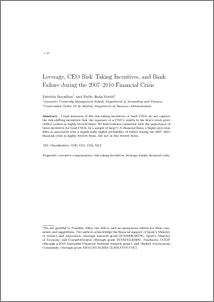Leverage, CEO Risk–Taking Incentives, and Bank Failure during the 2007–2010 Financial Crisis
Boyallian, Patricia and Ruiz-Verdu, Pablo
(2018)
Leverage, CEO Risk–Taking Incentives, and Bank Failure during the 2007–2010 Financial Crisis.
Review of Finance, 22 (5).
pp. 1763-1805.
ISSN 1572-3097
![[thumbnail of compensation-failure_ROF_final]](https://eprints.lancs.ac.uk/88453/1.hassmallThumbnailVersion/compensation_failure_ROF_final.pdf)

Preview
PDF (compensation-failure_ROF_final)
compensation_failure_ROF_final.pdf
- Accepted Version
Available under License Creative Commons Attribution-NonCommercial.
Download (572kB)
Abstract
Usual measures of the risk-taking incentives of bank CEOs do not capture the risk-shifting incentives that the exposure of a CEO’s wealth to his firm’s stock price (delta) creates in highly levered firms. We find evidence consistent with the importance of these incentives for bank CEOs: In a sample of large U.S. financial firms, a higher pre-crisis delta is associated with a significantly higher probability of failure during the 2007–2010 financial crisis in highly levered firms, but not in less levered firms.
Item Type:
Journal Article
Journal or Publication Title:
Review of Finance
Additional Information:
This is a pre-copy-editing, author-produced PDF of an article accepted for publication in Review of Finance following peer review. The definitive publisher-authenticated version Patricia Boyallian, Pablo Ruiz-Verdú; Leverage, CEO Risk-Taking Incentives, and Bank Failure during the 2007–10 Financial Crisis, Review of Finance, Volume 22, Issue 5, 1 August 2018, Pages 1763–1805, https://doi.org/10.1093/rof/rfx051 is available online at: https://academic.oup.com/rof/article/22/5/1763/4600197
Uncontrolled Keywords:
/dk/atira/pure/subjectarea/asjc/2000/2003
Subjects:
?? executive compensationfinancial crisisrisk-taking incentivesleveragebanks finance ??
Deposited On:
27 Oct 2017 12:22
Last Modified:
11 Dec 2025 02:41